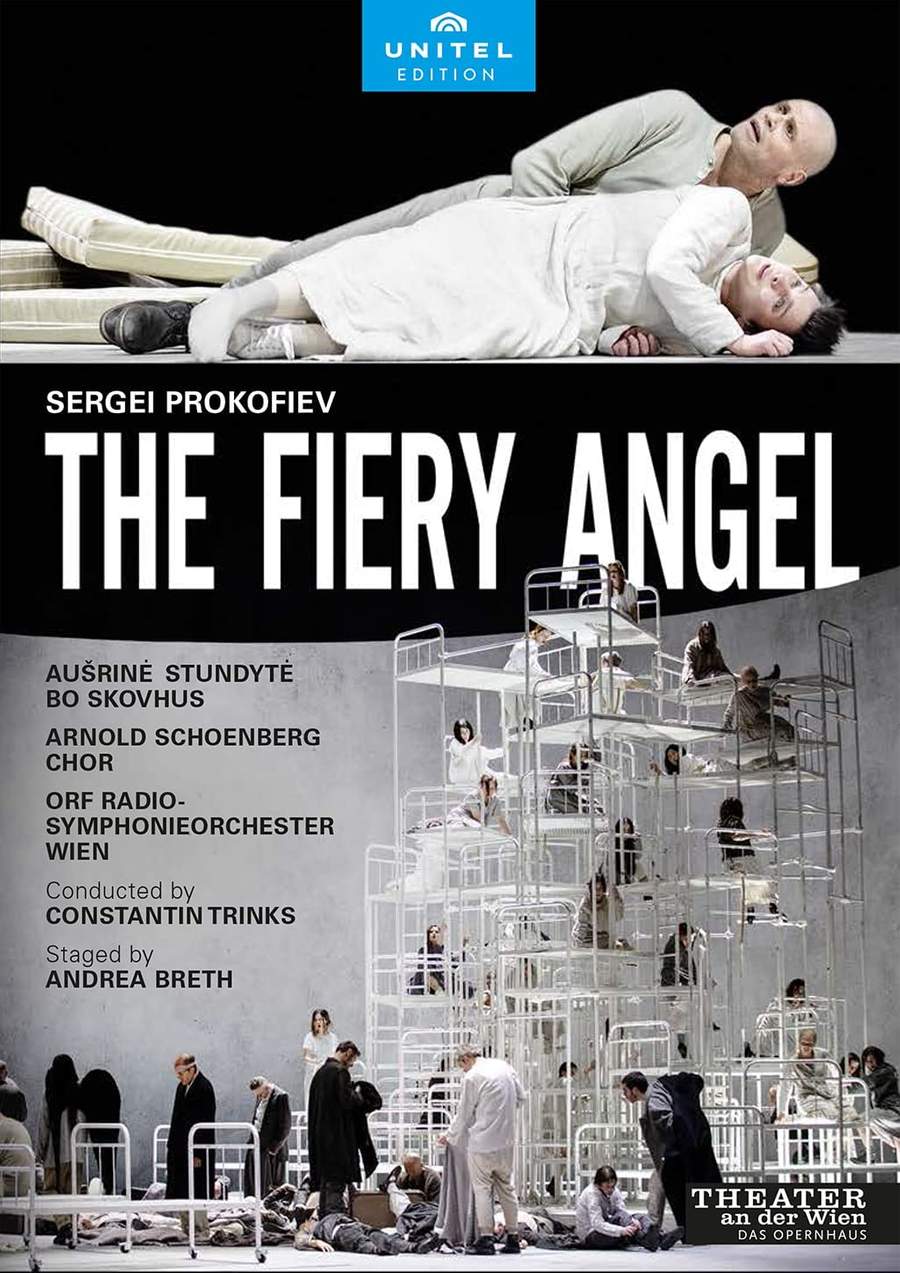PROKOFIEV The Fiery Angel (Trinks)
View record and artist detailsRecord and Artist Details
Genre:
Opera
Label: Unitel Editions
Magazine Review Date: 06/2022
Media Format: Digital Versatile Disc
Media Runtime: 124
Mastering:
DDD
Catalogue Number: 805908

Tracks:
| Composition | Artist Credit |
|---|---|
| (The) Fiery Angel |
Sergey Prokofiev, Composer
(Arnold) Schoenberg Choir Alexey Tikhomirov, Inquisitor, Bass Andrew Owens, Jacob Glock; Doctor, Tenor Aušrinė Stundytė, Renata, Soprano Bo Skovhus, Ruprecht, Baritone Constantin Trinks, Conductor Eléna Zaremba, Fortune-Teller, Mezzo soprano Kristján Jóhannesson, Innkeeper; Servant, Baritone Markus Butter, Mathias Wiessman; Johann Faust, Baritone Natascha Petrinsky, Landlady; Mother Superior, Mezzo soprano Nikolai Schukoff, Agrippa; Mephistopheles, Tenor Vienna Radio Symphony Orchestra |
Author: Marina Frolova-Walker
For many years I’ve been trying to persuade people that The Fiery Angel is Prokofiev’s best opera. The others have their musical weak spots, but the Angel doesn’t: it grips us and astonishes from the first note to the last. It is a study in obsession, although it is not so much about Renata’s obvious obsession with the angel Madiel but rather Ruprecht’s obsession with Renata. When we are introduced to Ruprecht, he is a cynical womaniser ready to take advantage of the vulnerable Renata, but she drags him through several circles of psychological hell due to her delusions and emotional blackmail. In the end, Ruprecht needs rescuing, and this comes from an operatic Mephistopheles, who enables him to break out of his own story and ‘retune the viol’ of his soul. Prokofiev’s own deep fear of being led astray by an attractive woman is stamped on the libretto, which was his own work, and his frustration with ‘feminine wiles’ can also be detected (he was a very engaging diarist, and recorded such feelings).
The staging by Andrea Breth unfortunately makes a nonsense of all this from the outset: Ruprecht is presented as just another inmate in a psychiatric ward, next to Renata and other characters. In this setting, there is little that can surprise or shock us, since we already know that everyone is afflicted in one way or another, and it is difficult to become emotionally involved with a medical casebook. The new setting also reduces stage action to a minimum, a problem only exacerbated by Martin Zehetgruber’s claustrophobic monochrome design. Only in the very last scene are we rewarded with genuine spectacle: an impressive construction built from the same dreary hospital beds, which accommodate the valiant members of the Arnold Schoenberg Choir.
In these unpropitious surroundings, Aušrinė Stundytė manages to deliver a truly star performance as Renata. Her voice is powerful, flexible and beautiful, while her delivery is magnetic and her acting superb. I would happily queue for tickets on a rainy day in order to hear her live, and her performance by itself makes the enterprise worthwhile. Bo Skovhus as Ruprecht is seriously undermined by the production, which not only removes all dramatic purpose from his character but also places him too far away from Renata for any real interaction (perhaps due to ‘social distancing’). Even so, he is vocally impressive and tries his best to act out the director’s instructions with conviction. The rest of the cast have relatively small parts but they too perform at a very high level, and the choir are magnificent.
The opera was a labour of love for Prokofiev (there was no commission), and he toiled at the score for much of the 1920s. He never had the chance to see it during his lifetime, and the premiere, in Paris, took place two years after his death. In the hands of conductor Constantin Trinks and the Vienna Radio Symphony Orchestra, the score reveals details of spellbinding intricacy, richly dark harmonies, luxuriant counterpoint and piquant orchestration. The sound production puts a premium on clarity, at the cost of the rawness and raucousness that is desirable for this opera. To allow the singers to be heard over the orchestral racket, the orchestra is tidy and well-behaved, and the sound engineer places it firmly in the background. The opera loses some of its hysteria, but there is an argument for one recording, at least, that allows us to hear all the notes.
Musically, this DVD can stand its ground when placed opposite the classic 1991 Mariinsky/ROH recording (Arthaus Musik, 10/03), but in terms of the production, the only point in its favour is that it eschews the Mariinsky’s distracting nudity. Prokofiev asked for the curtain to drop at the moment when the heroine is condemned, denying us resolution, but even this is not respected in the Vienna production. To be as fair as possible, this production saw the light of day during the lockdowns, streamed from an almost empty theatre while audiences were confined to their homes and going crazy, so its vision of illness and claustrophobia allows it to stand as a monument to those times.
Discover the world's largest classical music catalogue with Presto Music.

Gramophone Digital Club
- Digital Edition
- Digital Archive
- Reviews Database
- Full website access
From £8.75 / month
Subscribe
Gramophone Full Club
- Print Edition
- Digital Edition
- Digital Archive
- Reviews Database
- Full website access
From £11.00 / month
Subscribe
If you are a library, university or other organisation that would be interested in an institutional subscription to Gramophone please click here for further information.




